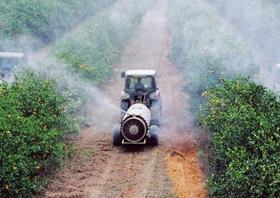
Children who live in agricultural areas have lower lung capacities due to pesticide exposure, a new study has claimed.
Researchers at the University of Berkeley, in the US, tested 279 children living in California’s Salinas Valley and found that levels of organophosphate pesticide in their urine was linked to decreased lung function. This would equate to eight per cent less air when blowing out a candle, and is similar to passive smoking.
The study, published in the journal Thorax, is the first to link chronic, low-level exposures to organophosphate pesticides to lung health for children.
The study did not examine how the children may have been exposed to pesticides, but it recommended that farmworkers remove their work clothes and shoes before entering homes. Children should also be kept away when nearby fields are being sprayed with pesticides, and windows should be closed. Pesticide exposure can also be reduced by washing fruits and vegetables thoroughly before eating, researchers said.
“Researchers have described breathing problems in agricultural workers who are exposed to these pesticides, but these new findings are about children who live in an agricultural area where the organophosphates are being used,” said author Professor Brenda Eskenazi. “This is the first evidence suggesting that children exposed to organophosphates have poorer lung function.”
The researchers collected urine samples five times throughout the children’s lives, from age six months to five years, and measured the levels of organophosphate pesticide metabolites each time. When the children were seven years old, they were given a spirometry test to measure the amount of air they could exhale.
The study accounted for other factors that could affect the results, such as whether the mothers smoked, air pollution, presence of mould or pets in the home and proximity to highways.
“The kids in our study with higher pesticide exposure had lower breathing capacity,” said lead author Rachel Raanan. “If the reduced lung function persists into adulthood, it could leave our participants at greater risk of developing respiratory problems like COPD (chronic obstructive pulmonary disease).”
Although organophosphate pesticides are still widely used, in California, use of organophosphates in agriculture has declined significantly from 6.4 million pounds in 2000, when the study began, to 3.5 million pounds in 2013.
Last month, the US Environmental Protection Agency proposed eliminating all agricultural uses of chlorpyrifos, one of the most heavily used organophosphates, and others are also under evaluation.



